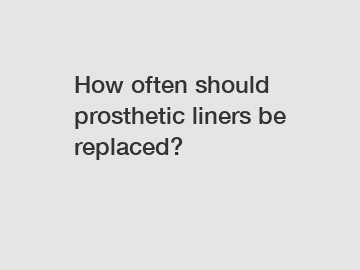Prosthetic liners are an essential component of any prosthesis, providing cushioning and protection for the residual limb while ensuring a secure fit and comfortable wear. However, like any other piece of equipment, prosthetic liners have a limited lifespan and need to be replaced periodically to maintain optimal performance and comfort. But how often should prosthetic liners be replaced?
The answer to this question can vary depending on a variety of factors, including the type of liner being used, the level of activity of the user, and the overall wear and tear on the liner. In general, most prosthetists recommend replacing prosthetic liners every 6 to 12 months. However, some users may need to replace their liners more frequently, especially if they are particularly active or have certain skin conditions that can affect the lifespan of the liner.
One of the main reasons why prosthetic liners need to be replaced regularly is due to the wear and tear that occurs over time. The constant friction and pressure that occurs when wearing a prosthesis can lead to the deterioration of the liner, reducing its effectiveness and comfort. Additionally, as the liner wears down, it can also become more prone to developing tears, cracks, or other damage that can compromise its performance. Regularly replacing the liner can help ensure that the user continues to experience a secure fit and comfortable wear.

Another important reason for replacing prosthetic liners is to prevent skin irritation and other skin issues. As the liner deteriorates, it can become rough or abrasive, leading to chafing, blisters, or other skin problems. This can not only be uncomfortable for the user but can also increase the risk of infection or other complications. By replacing the liner regularly, users can help maintain the health of their skin and prevent any potential issues from developing.
In addition to wear and tear, the level of activity of the user can also play a role in how often prosthetic liners need to be replaced. Those who are highly active or participate in activities that put a lot of strain on the prosthesis may find that their liners wear out more quickly than those who are more sedentary. In these cases, users may need to replace their liners more frequently to ensure that they continue to receive the support and protection they need.
It's also important to consider any changes in weight or shape that may occur over time. Significant weight gain or loss can affect the fit of the prosthesis, potentially requiring adjustments or even a new liner to achieve a comfortable and secure fit. Users should be mindful of any changes in their body size or shape and consult with their prosthetist to determine if a new liner is necessary.
Overall, it's essential for users to pay attention to the condition of their prosthetic liners and replace them as needed to ensure optimal performance and comfort. Regularly scheduled appointments with a prosthetist can help monitor the condition of the liner and determine when it's time for a replacement. Additionally, users should communicate any changes in activity level, weight, or comfort to their prosthetist to ensure that they are receiving the most appropriate care for their specific needs.
In conclusion, prosthetic liners play a vital role in the comfort and function of a prosthesis and need to be replaced periodically to maintain optimal performance. While the general recommendation is to replace prosthetic liners every 6 to 12 months, individual factors such as activity level, changes in weight or shape, and overall wear and tear can influence how often a liner needs to be replaced. By staying proactive and working closely with a prosthetist, users can ensure that they are receiving the best possible care for their prosthetic liners and enjoying a comfortable and secure fit.
For more Orthopedic Vacuum Pump, weight-bearing self-locking pneumatic knee joint, orthopedic vacuum pumpinformation, please contact us. We will provide professional answers.


Comments
Please Join Us to post.
0